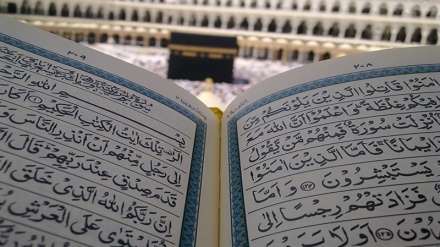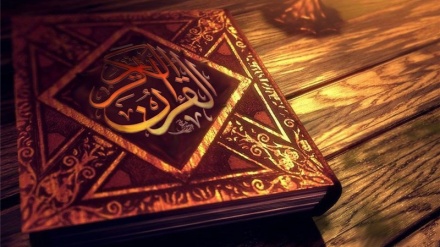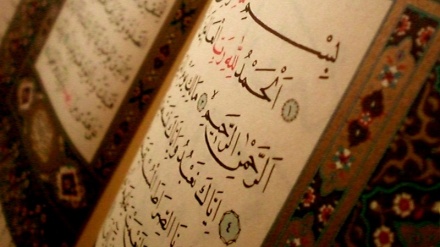Path towards Enlightenment (1050)
Welcome to our latest episode of “Path towards Enlightenment”, which is an endeavour to make you and us familiar with an easy and fluent explanation of God’s Final Scripture to all mankind, the Holy Qur’an that was revealed to the Last and Greatest of all Messengers, Prophet Mohammad (Blessings of God upon him and his progeny).
Last week we started explanation of Surah Muddassir, the 74th in order of compilation of the Holy Qur’an. It has 56 Ayahs and was revealed in Mecca as commandment for public proclamation of the message of monotheism without fear of the ringleaders of the pagan Arabs who were conspiring against the Prophet’s secret preaching of Islam. It opens by addressing the Prophet as “Muddassir” or the “One Wrapped in a Mantle”. It warns the obstinate disbelievers of their fate on the Day of Judgement and a specific opponent of the Prophet is singled out in Ayah 11. Towards its end the Surah exposes the foolishness of the disbelievers’ attitude to Divine Revelation and the Day of Resurrection.
It is narrated from the Prophet’s 5th Infallible Heir, Imam Mohammad Baqer (AS) that whoever recites Surah Muddassir in the obligatory ritual prayers, shall be elevated to accompany the Prophet and will be immune from the misfortune in this worldly life, provided he/she pays precise attention to its contents and acts upon them.
We continue from where we left you last Friday and here are Ayahs 38, 39, 40, 41, and 42:
"Every soul is hostage to what it has earned,
“Except the People of the Right Hand,
“[They will be] in gardens questioning
“Concerning the guilty:
“What drew you into Hell?'
If you might recall, in our explanation of the previous Ayahs of this Surah last week, we said that no reasonable person ever ridicules the philosophy of Divine laws and Allah has provided us with ample means of guidance to avoid pitfalls by striving for His proximity. We also said the warnings of the Almighty Creator are meant for all, so that the disbelievers and sinners repent of their misdeeds, and the virtuous strive to further firm up their faith and do more good deeds.
The Ayahs that we recited to you now means to say that the soul of every person is in bondage to what he or she has earned as a result of the deeds done, whether good or bad, on the basis of which the final judgement will take place on the Day of Resurrection. The virtuous will be free from such bondage and enter Paradise because of their firm faith in God and His commandments for which their record of deeds will be given in the right hand. As for those who died in disbelief or in the state of unrepentant sins, they will remain in bondage for the punishment.
A famous hadith from the Prophet’s 5th Infallible Successor, Imam Mohammad Baqer (AS), says: “We and our adherents are people of the Right Hand.”
From the bliss of the gardens of Paradise the virtuous people will be able to witness the punishment of the people of Hell, and will ask them the reason for their miserable fate.
From these Ayahs we learn that:
- Our deeds determine our fate.
- Disbelief, denial of truth, and sins without repentance hold the sinners as hostages for Divine punishment on the Day of Resurrection.
- The mere committing of a sin does not mean that such a person will be cast in Hell, since the gates of forgiveness are open for those seeking repentance while alive, in the Court of the All-Merciful Creator.
Now we invite you to listen to Ayahs 43, 44, 45, 46, 47, and 48 of the same Surah:
“They (the denizens of Hell) will answer,
“We were not among those who prayed.
“Nor did we feed the poor.
“We used to gossip along with the gossipers,
“And we used to deny the Day of Resurrection,
“Until the certain event (death) came to us.
“So the intercession of the intercessors will not avail them."
In continuation of the previous Ayahs, the denizens of Hell, in reply to the question of the dwellers of Paradise, will cite four main reasons for being cast into the Eternal Inferno. First, they did not maintain the daily obligatory ritual prayers. Second, they were indifferent towards the poor and the needy, and instead of providing welfare for the needy, they were occupied with the spending of whatever they possessed for their own selves and for their families. Third, they were habitual gossipers actively involved in the gatherings of the vain and corrupt talkers. Fourth, they did not believe in the Day of Resurrection and used to deny its occurrence. This was the state of their affairs, until death which is “yaqeen” or definite, ended their mortal life in the transient world.
It means there is no escape from death, which when it befalls the disbelievers and the unrepentant sinners, deprives them of the intercession in the Divine Court of those whom God has granted the power to intercede with Him for persons deserving forgiveness. The Prophet’s 6th Infallible Successor, Imam Ja’far Sadeq (AS) informed his dear and near ones: “Whoever belittles the daily ritual prayers (and does not perform them) will not avail of our intercession (in the Divine Court)."
From these Ayahs we learn that:
- Those who do not perform the daily ritual prayers and those who do not pay attention to the needs of the poor, shall be cast into Hell.
- The act of gossiping and keeping the company of the evil ones who pass their time in lies, falsities, backbiting, calumny, and spread of rumours, leads to the fires of Hell.
- The deniers of the occurrence of the Day of Resurrection will have a rude awakening and end up in Hell.
- The All-Merciful Creator forgives those who rectify their disbelief with acceptance of faith, and has granted the power of intercession to His Righteous servants, such as the Prophets, the Imams, the Martyrs, the pious scholars, the angels, and the Holy Qur’an to intercede with Him for forgiveness of the faults and shortcomings of the deserving persons.
Let us now listen to Ayahs 49, 50, and 51:
"What it the matter with them that they evade the Reminder,
“As if they were terrified asses,
“Fleeing from a lion?
The pagan Arabs of Mecca used to flee from the Prophet's invitation and recitation of the Holy Qur'an, and would prevent others from listening to the words of truth. These Ayahs thus eloquently describe the dire fate of the obdurate disbelievers, whether atheists or polytheists, destined for Hell and their fear of hearing the word of Truth or any reminder and admonition. Such persons are likened to wild asses, devoid of understanding and terrified of the approach of a lion, whereas the message of the Holy Qur’an is aimed at their awakening and not something to fear.
It is monotheism that transforms us into real believers eager to acknowledge the truth and determined to promote it, while disbelief breeds cowardice and undue fears of the realities.
From these Ayahs we learn that:
- The flawless eloquence and timeless wisdom of the Holy Qur’an is the key to the salvation of mankind and is not something to be afraid of.
- The stupidity of the disbelievers in escaping from the Ultimate Truth is likened to the undue fears of wild asses.
In conclusion of this week’s episode of Path towards Enlightenment we explain to you Ayahs 52, 53, 54, 55, and 56 which mark the end of Surah Muddassir:
“Rather every one of them desires to be given unrolled scriptures [from
Allah];
“No indeed! Rather they do not fear the Hereafter.
“No indeed! It is indeed a Reminder.
“So let anyone who wishes, remember it.
“And they will not remember unless Allah wishes; “He is worthy of [your] being wary [of Him] and He is worthy to forgive."
These Ayahs, in response to the irrational demand of the pagan Arabs to the Prophet that God should send scriptures addressing them by their names, mean to say that such words reflect their lack of belief in Resurrection and the Day of Judgement, hence their refusal to accept the truth of the Holy Qur'an. The Holy Qur'an is indeed a Reminder and a source of remembrance for the seekers of truth. God definitely helps us discover the Right Path, when it is earnestly sought. The last point is that Only Allah is worthy of being worshipped without ascribing any partners to Him, and He Alone can forgive us.
These Ayahs teach us the following points:
- Arrogance and ignorance result in irrational and undue demands.
- Pretexts and forgery neither negates the truth nor provides the means to avoid and escape it.
- Guidance is two dimensional – human will and Allah's Mercy that paves the way towards the eternal bliss of Paradise.
Well, on this note we have come to the end of the explanation of Surah Muddassir. In our next weekly episode, we take up explanation of Surah Qiyamah.
RM/AS/ME


